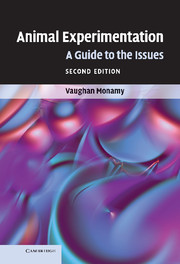Book contents
- Frontmatter
- Contents
- Preface to the second edition
- Acknowledgements
- 1 Issues in animal experimentation
- 2 A history of animal experimentation
- 3 Opposition to animal experimentation
- 4 The moral status of animals
- 5 Animal use
- 6 The regulation of experiments
- 7 Seeking alternatives
- 8 Conclusions
- Ethical guidelines for students in laboratory classes involving the use of animals or animal tissues
- References
- Index
7 - Seeking alternatives
Published online by Cambridge University Press: 05 June 2012
- Frontmatter
- Contents
- Preface to the second edition
- Acknowledgements
- 1 Issues in animal experimentation
- 2 A history of animal experimentation
- 3 Opposition to animal experimentation
- 4 The moral status of animals
- 5 Animal use
- 6 The regulation of experiments
- 7 Seeking alternatives
- 8 Conclusions
- Ethical guidelines for students in laboratory classes involving the use of animals or animal tissues
- References
- Index
Summary
Perhaps one can see a future where an animal experiment imposes no more on the animal than does domestication, and yet can be seen as providing a new fulfilment for the animal world – a companionship with man in advancing knowledge and, for both, a diminishment of future suffering.
William Paton (1993, p. 230)INTRODUCTION
Despite enormous advancements in research animal welfare, criticism of animal experimentation remains as vociferous today as it has ever been. The past 25 years have seen a revitalisation of the animal welfare movement and a consequent proliferation of literature regarding moral, ethical or regulatory aspects of animal experimentation. After Peter Singer (1975) and Tom Regan (1983) re-stimulated debate through their professional interests in the moral status of animals and ethical aspects of animal research, advocates for the humane treatment of animals, such as Richard Ryder (1975) and Bernard Rollin (1981), chronicled many examples of modern research of dubious merit and legitimately challenged the value of results obtained from certain poorly designed experiments.
In the past 25 years in the UK and elsewhere, there were unconscionable physical attacks on scientists, their laboratories and their families by members of an extremist fringe who believed that the cause of animal welfare could be advanced more quickly by the publicity their actions generated.
- Type
- Chapter
- Information
- Animal ExperimentationA Guide to the Issues, pp. 74 - 97Publisher: Cambridge University PressPrint publication year: 2009



